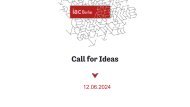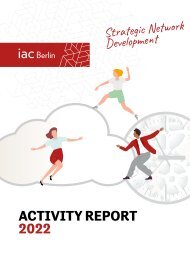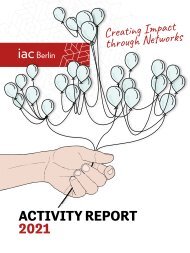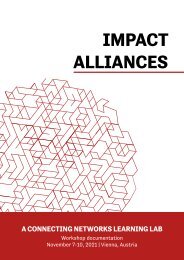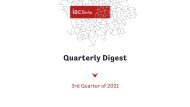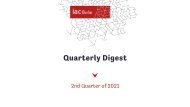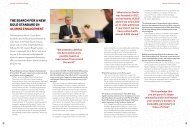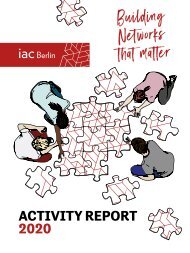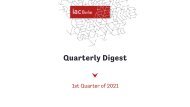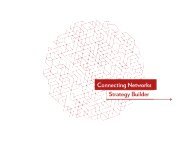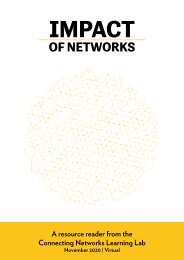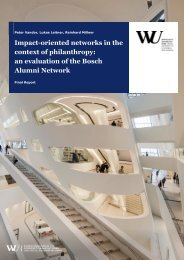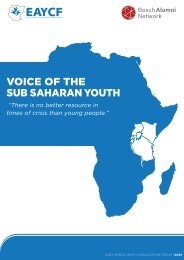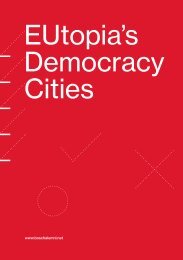iac Berlin - Activity Report 2023
Relational approaches - such as multi-community networks, impact alliances, or ecosystems - are increasingly recognized for their potential to support sustainable solutions and to nurture greater resilience while navigating complex challenges. At the same time, lacking experience in collaboration is a major risk to philanthropic sustainability. Expertise in building and sustaining alliances and networks is scarce, while intermediary organizations, networks, and movements around the world complain that there is still a lack of resources and appropriate funding instruments to develop and coordinate emerging approaches. In this Activity Report we share our learnings on the “How?” to contribute to a better understanding and the further development of relational approaches in the field of philanthropy.
Relational approaches - such as multi-community networks, impact alliances, or ecosystems - are increasingly recognized for their potential to support sustainable solutions and to nurture greater resilience while navigating complex challenges.
At the same time, lacking experience in collaboration is a major risk to philanthropic sustainability. Expertise in building and sustaining alliances and networks is scarce, while intermediary organizations, networks, and movements around the world complain that there is still a lack of resources and appropriate funding instruments to develop and coordinate emerging approaches.
In this Activity Report we share our learnings on the “How?” to contribute to a better understanding and the further development of relational approaches in the field of philanthropy.
Create successful ePaper yourself
Turn your PDF publications into a flip-book with our unique Google optimized e-Paper software.
ACTIVITY REPORT<br />
<strong>2023</strong><br />
The “How” of<br />
relational approaches
Editorial<br />
CONTENT<br />
DEAR COLLEAGUES AND FRIENDS,<br />
03<br />
04<br />
07<br />
10<br />
12<br />
14<br />
16<br />
18<br />
19<br />
20<br />
21<br />
22<br />
23<br />
Editorial<br />
What are relational approaches in philanthropy, and why do they matter?<br />
Ecosystem Catalyzation: A new approach for philanthropy<br />
How can a decentralized network ensure engagement and participation?<br />
Peer-to-peer learning—Strengthening a network’s members as change agents<br />
Building relational infrastructure that can hold in times of polarization and division<br />
How unlikely partnerships can empower youth to become future conflicts mediators<br />
A practitioner network for relational approaches<br />
Our Commitment to Sustainability<br />
Finance & Accounting<br />
General Information<br />
What we do and why we do it<br />
Impressum<br />
Relational approaches—such as multi-community networks, impact alliances, or ecosystems—<br />
are increasingly recognized for their potential to support sustainable solutions and to nurture<br />
greater resilience while navigating complex challenges.<br />
At the same time, lacking experience in collaboration is a major risk to philanthropic sustainability.<br />
Expertise in building and sustaining alliances and networks is scarce, while intermediary<br />
organizations, networks, and movements around the world complain that there is still a lack of<br />
resources and appropriate funding instruments to develop and coordinate emerging approaches.<br />
In this <strong>Activity</strong> <strong>Report</strong> we share our learnings on the “How?” to contribute to a better understanding<br />
and the further development of relational approaches in the field of philanthropy.<br />
To create a baseline of understanding, we have collected perspectives from peers—key learnings<br />
and stories about how we as a field may understand, apply, and experience relational approaches.<br />
From this base, we deep-dive into one specific approach and introduce the concept of<br />
Ecosystem Catalyzation. This has been an important line of thought for the <strong>iac</strong> <strong>Berlin</strong> in <strong>2023</strong><br />
and culminated in a dedicated Learning Lab in Oxford in November.<br />
More hands-on examples of working with relational approaches are being provided by the<br />
Bosch Alumni Network, which elaborate on the question of how a decentralized network can<br />
ensure engagement and participation as well as on their experience with peer-to-peer learning<br />
formats to strengthen the network’s members as change agents.<br />
Our new partner, the Othering and Belonging Institute, contributes a piece about how to build<br />
relational infrastructure that can hold in times of polarization and division. Amidst the current<br />
backdrop of fragmentation, mistrust, and a growing far right, the article illustrates how to counter<br />
this division through bridging and coalition-building.<br />
From the Global Diplomacy Lab, we learn about how to increase creativity, reach, and<br />
momentum through unlikely partnerships as they co-hosted a peace lab in cooperation with<br />
the city of Osnabrück in Germany from October until November <strong>2023</strong>.<br />
All of these reports, findings, and learnings are concluded by an update on the Wasan<br />
Network—a global community of practitioners who have been working on relational approaches<br />
in various forms for many years now.<br />
Our work is made possible thanks to the support and collaboration of so many colleagues<br />
and partners. It is a privilege to be connected to all of you through our shared ambitions and<br />
initiatives.<br />
Now, and without any further ado, I wish you all an inspiring and enjoyable time reading our<br />
<strong>Activity</strong> <strong>Report</strong> <strong>2023</strong>.<br />
With warmest regards,<br />
Darius Polok, on behalf of the entire <strong>iac</strong> <strong>Berlin</strong> team<br />
02<br />
03
Relational Approaches<br />
WHAT ARE RELATIONAL APPROACHES IN<br />
PHILANTHROPY, AND WHY DO THEY MATTER?<br />
Our institutions and established social<br />
mechanisms are not prepared to take<br />
on the challenges of the world’s ongoing<br />
“poly-crisis”—the multiple, overlapping<br />
global crises of our times. To meet these<br />
challenges, we need radical transformation:<br />
a post-growth understanding of the<br />
economy, post-industrial education, and<br />
a fundamental evolution in how organizations<br />
and philanthropy work towards change.<br />
We need to critically reflect on our own<br />
roles and develop new practices and cultures<br />
of collaboration. We need to find the<br />
courage to reshape our current structures<br />
into a new modus operandi.<br />
In exploring new forms of collaboration, we and our partners<br />
have found great potential in “relational approaches.” This<br />
concept focuses on building trust-based relationships that<br />
create space for emergence: unplanned effects resulting from<br />
interactions within complex systems. These effects could<br />
provide us with the innovative means needed to advance<br />
transformation.<br />
While there is currently no commonly acknowledged definition<br />
of what relational approaches are in philanthropic practice, some<br />
characteristics seem to endure the discourse.<br />
Relationships before impact<br />
The basis of relational approaches is formed by two interlinked<br />
concepts. The first concept is that collaboration is essential to<br />
creating impact—especially at a societal or system level—and<br />
trust is essential for collaboration to thrive. Although the direct<br />
link between trust and impact has long been recognized in the<br />
field of philanthropy, there is still much room for development<br />
as many philanthropic organizations still adhere to a controloriented<br />
approach to impact and its measurement.<br />
The second concept is less established. It links the importance<br />
of trust with the belief that building trusting relationships is in<br />
itself an impactful endeavor. Thus, rather than investing in a pre-<br />
defined outcome, investment should be made in building<br />
trust and the infrastructure needed to sustain it. In this way,<br />
outcomes can emerge from the interactions of stakeholders<br />
on a given issue. In line with systems thinking and complexity<br />
science, this approach creates the potential for constellations<br />
that not only respond to the initial challenge but also to the<br />
interdependencies that are connected to that challenge.<br />
Relational approaches can range from investing a substantial<br />
amount of time into trust-building before entering a formal<br />
partnership, to nurturing a network of relationships within an<br />
ecosystem. Relational approaches also suggest that the power<br />
needed to act on the poly-crisis can be better achieved in<br />
trustful relationships rather than linear ones, with emergence<br />
leading to more effective outcomes over time.<br />
Acting within a system<br />
If philanthropy were to fully embrace this logic, it would<br />
ignite a thorough process of change as it would mean for<br />
organizations to understand themselves as actors within the<br />
system they are trying to reshape—not outside of that system.<br />
The ambition to reshape a system would also require the<br />
philanthropic organization to reposition and change itself as<br />
well—in response to what the system feeds back. Thus, both<br />
the structure and culture of philanthropy as we know it would<br />
become a dynamic field of development.<br />
Another consequence of adopting relational approaches<br />
would be a shift in power-sharing. From both a relational and<br />
a systems thinking perspective, decentralizing decision-making<br />
around the allocation and use of resources would strengthen<br />
a system’s ability to adapt as it undergoes a process of change.<br />
The growing experiences, practices, and outcomes around<br />
relational approaches have the potential to be applied to all<br />
areas in the field of social change. At <strong>iac</strong> <strong>Berlin</strong>, we have been<br />
engaged in this exploration, experimenting with relational<br />
approaches with our partners for a few years now. For our<br />
<strong>Activity</strong> <strong>Report</strong> <strong>2023</strong>, we have invited in perspectives, learnings,<br />
and stories to provide you with a diverse collection of how<br />
colleagues in philanthropy currently apply and experience<br />
relational approaches.<br />
Join us on this journey into a new way of working.<br />
Impact through relationships<br />
For us, relational approaches not only mean "relationships<br />
before impact," but "impact through relationships”. This<br />
refers to the foundation's approach of funding with trust<br />
and flexibility. We are increasingly investing considerable<br />
time and resources in building trust and relationships with<br />
our partners, which for example involves an explicit initiation<br />
phase in which we get to know better the needs of the<br />
organizations we support. These changes lead to a shift in<br />
our role: from a traditional asymmetrical power structure to<br />
a real partnership.<br />
In our opinion, this conscious investment leads to better<br />
project outcomes and greater outreach to organizations<br />
and partners we don’t always work with. And it enables the<br />
sharing of power and responsibility as well as cooperation<br />
on an equal footing. In the end, it is our partners who bring<br />
about social change—and they know best what needs to be<br />
done. If our partners can do their job well, we can achieve<br />
our own goals as well.<br />
Working with relational approaches is not always easy as the<br />
positive effects are not immediately measurable. It requires<br />
patience and trust in the shared process and a change in our<br />
own attitude as a foundation: we need to consciously take a<br />
step back. A challenge is the—often incorrect—assumption<br />
that power-sharing in relational approaches means a loss or<br />
a reduction of a foundation’s influence. But there are a lot of<br />
gains: reputation and network growth, increased impact by<br />
reaching the right target groups, and most importantly more<br />
legitimacy.<br />
In our experience, investing in relational approaches is a<br />
learning process that eventually leads to improved collaboration<br />
and, as a result, more effectiveness and impact.<br />
SILKE BREIMAIER<br />
Senior Manager<br />
Future Issues and<br />
Foundation Development,<br />
Robert Bosch Stiftung<br />
MARKUS LUX<br />
Senior Vice President<br />
Global Issues,<br />
Robert Bosch Stiftung<br />
BEN RODGERS<br />
Executive Officer Inner North Community Foundation/<br />
Chair Community Foundations Australia<br />
Culture of relational approaches<br />
The American baseball player Yogi Berra once said: “Always<br />
go to other people's funerals, otherwise they won't come to<br />
yours.” I sometimes think about this quote when I’m heading<br />
to a community event on weekends or at night. Community<br />
life doesn’t happen 9-5, Monday to Friday. People have their<br />
existing interests, and meeting people where they are at is<br />
critical to forming strong relationships.<br />
At the Inner North Community Foundation, we support<br />
32 suburbs of Melbourne, Australia. It’s a bustling place<br />
of approximately 500,000 people, 45,000 business, 898<br />
charities, 142 schools. There are pockets of advantage, and<br />
places where people are working hard to get out of tough<br />
situations. For the Community Foundation to be relevant,<br />
people in our community need to know us, like us, and trust us.<br />
Getting to relationships of trust means to focus on a culture<br />
of relational approaches. This includes:<br />
» How we communicate with the world: We are real people<br />
wanting to have real conversations. Artificial barriers delay<br />
getting to authentic relationships.<br />
» How we show up: To understand our community means<br />
being open to the breadth of activity happening. This<br />
means that we can triangulate data points and try and see<br />
new ways forward.<br />
» How we arrange governance: Like the community groups<br />
we fund, we are part of civil society.<br />
» What we do: It is not enough to just know someone and<br />
hold them in positive regard. Trust comes from saying<br />
what you will do and doing what you say.<br />
It’s these relationships—built on trust—that accelerate our<br />
common progress.<br />
04<br />
05
Relational Approaches<br />
Ecosystem Catalyzation<br />
SUSAN SNIDER<br />
Vice President, Strategy, Innovation<br />
and Impact, Equality Fund<br />
Relational infrastructure as strategy<br />
At the Equality Fund, relational infrastructure, as a path<br />
to lasting social transformation, is both a strategic choice<br />
and a tactical practice. As a strategy, we’re choosing to<br />
fuel movements. As a result, we’re not building offices<br />
around the world. Neither are we leading from the front.<br />
With the choice to pursue a relational strategy, we are also<br />
learning (and unlearning) how to put this into practice.<br />
We’re ceding power and control. We’re working to fuel the<br />
incredible wisdom, creativity, and experience of people<br />
around the world. And we’re seeing individuals lead change<br />
inside of their own communities that can have lasting impact.<br />
Traditional ways of working can be incremental and siloed.<br />
We need new, catalytic strategies that have an exponential<br />
impact trajectory. We believe relational strategies and<br />
the practice of relational approaches are one of the few<br />
levers we can deploy to help society move faster than<br />
the pace of the problems we face.<br />
New capacities for collective action<br />
“How do we practice new paradigms in philanthropy?”<br />
This is the purpose of PEX, a community of over 350<br />
practitioners in the field of philanthropy infrastructure.<br />
Future-fit, diverse philanthropy that paves the ways to<br />
regenerative societies and always raises to the challenges<br />
of our times is the vision of Philea’s Futures Philanthropy<br />
initiative. Both focus on creating a new culture centered<br />
on relationships and shared leadership—moving away<br />
from traditional notions of hierarchy and power to embodying<br />
leadership through ideas and responsibility.<br />
Fostering relational approaches in professional settings<br />
means showing up as you are, sharing vulnerabilities and<br />
challenges. We are not used to talking about these in<br />
professional settings, which can open up opportunities but<br />
also create tension. Personal encounters that focus<br />
on getting to know each other and building deep relationships,<br />
without the pressure to deliver results, can become<br />
the seeds of transformative change in the future—if we are<br />
patient and let go of control.<br />
To get there, we need to redefine what we mean by "action"<br />
and "results”. Our established ways of action have not produced<br />
the results we wanted to see, while today's times of<br />
uncertainty and complexity, where cause and effect are often<br />
unclear, force us to radically rethink how we learn, work, and<br />
collaborate.<br />
We need to create new capacities for collective action, and<br />
that starts with a new culture that allows for imperfection,<br />
humility, and the acknowledgement that sometimes we don't<br />
know.<br />
HANNA STÄHLE<br />
Head of Foresight and Innovation,<br />
Philea<br />
ECOSYSTEM CATALYZATION: A NEW<br />
APPROACH FOR PHILANTHROPY<br />
Navigating an increasingly complex world<br />
requires a seismic shift in the way that<br />
actors in the field of philanthropy and<br />
social change understand their role and<br />
define their strategies. Taking an ecosystem<br />
perspective and approaching change as an<br />
ongoing process of catalyzation helps us<br />
to step into the unpredictable dynamics of<br />
interconnected systems with more strategic<br />
clarity about our role, posture, and key<br />
interventions.<br />
Understanding ecosystems<br />
In evolutionary biology an “ecosystem” is defined as a community<br />
of diverse and interdependent living organisms in conjunction<br />
with the physical environment. Despite fluctuations in populations<br />
and disturbances in their environment, ecosystems<br />
tend towards ecological stability, or equilibrium. This process<br />
of co-evolution between a changing environment and the<br />
nested ecosystem is possible through the development of<br />
new features and functions at the level of the organisms<br />
involved. The ability of an ecosystem to maintain equilibrium<br />
despite disturbances is called resistance and how readily an<br />
ecosystem returns to equilibrium after being disturbed is called<br />
resilience. Ecosystems with higher biodiversity, redundancy,<br />
and modularity tend to show greater resistance and resilience<br />
when facing disruptive events. Some ecosystems are built<br />
around a keystone species that have low functional redundancy.<br />
This means that there are no other species in the ecosystem<br />
that can serve the same function and if the species were to<br />
disappear from the ecosystem, no other species would be able<br />
to fill its ecological niche.<br />
Applying ecosystemic thinking to philanthropic practice, we<br />
use the term ecosystem to refer to “socio-ecological systems”,<br />
where diverse and interconnected actors are intricately tied<br />
by cultural practices, identities, intentions, roles, beliefs, values,<br />
and available resources. In this understanding, ecosystems yield<br />
societal value that transcends the capacity and intentions of<br />
individual actors.<br />
If we want to work consciously with the shifting dynamics<br />
of an ecosystem, we need to redefine our understanding of<br />
terms, like “actor”, “change”, and “impact”, which are coming<br />
from language developed for linear and predictable processes.<br />
Our understanding of “strategy” will also shift as soon as we<br />
acknowledge that we cannot control and predict change.<br />
Understanding catalyzation<br />
Catalyzation can be understood as a continual process of<br />
stimulating the reconfiguration of an ecosystem. Through this<br />
process, the key factors that define the core-functioning of<br />
the ecosystem, such as power, resource flows, relationships,<br />
and purpose, are reconfigured. 1 Stimulation may happen on<br />
different levels simultaneously until there is a tipping point<br />
and a new equilibrium is reached in which emergent patterns<br />
become dominant.<br />
In our understanding, a “catalyst” can be any element from<br />
within the given ecosystem or from the wider environment that<br />
is influential in stimulating a re-configuration. Some catalysts<br />
may not have any intention to affect change or even be aware<br />
of the ecosystem they are influencing. However, in this text we<br />
are focusing on actors that consciously step into a catalytic role<br />
with the intention of stimulating and nudging the ecosystem<br />
towards a new value proposition and greater resilience.<br />
1<br />
Leadbeater, C. & Winhall, J. (2020): “Building better systems:<br />
A green paper on System Innovation.” The Rockwool Foundation, (31-38).<br />
06<br />
07
<strong>iac</strong><br />
Actors<br />
& Roles<br />
Ecosystem Catalyzation as an approach<br />
When working with the concept of Ecosystem Catalyzation, we<br />
are entering the area of pattern-based leadership. As we seek<br />
to understand an ecosystem’s shifting dynamics, we engage in<br />
a continual process of stimulating and learning from emergent<br />
patterns. This approach includes four main shifts 2 :<br />
» From cause-and-effect to probe-sense-respond<br />
» From pre-defined outcomes to learning-oriented approaches<br />
» From fail-safe design to safe-to-fail experimentation<br />
» From efficiency to resilience<br />
There are various complexity-oriented frameworks that can<br />
help us identify how and where to intervene in an ecosystem.<br />
In partnership with resense360, we have developed a methodology<br />
based on our collective practices called “ecosystem<br />
cards” which works with six key areas for strategic intervention. 3<br />
Purpose<br />
& Outcomes<br />
Connections<br />
& Relationships<br />
Values<br />
& Core Beliefs<br />
Resources<br />
Rules<br />
& Norms<br />
The design of each intervention will depend on the intention<br />
of the intervenor(s) and their understanding of an ecosystem’s<br />
current and highest potential. Strategic experiments made to<br />
stimulate certain parts of the ecosystem can give rise to new<br />
patterns on very different levels. As such, interventions should<br />
be designed to be small enough and safe-to-fail, allowing us to<br />
observe and learn from the reactions of the ecosystem.<br />
Rather than looking for ways to improve efficiency, working<br />
towards resilience should be the principle guiding all interventions.<br />
We can nurture the adaptability and self-sustainability<br />
of the ecosystem and actors within it by following three key<br />
principles:<br />
1. Diversity: Integrate new and relevant elements, such as<br />
actors or resources, to increase the total number involved in<br />
the ecosystem.<br />
2. Redundancy: Involve multiple actors performing the same<br />
role, particularly where there is a higher chance they may<br />
step out of the ecosystem.<br />
3. Modularity: Ensure multiple and alternate connections<br />
between actors in the ecosystem to reduce the risk of value<br />
flows being interrupted. 4<br />
Strategic choices regarding structure & roles<br />
Actors wishing to work with Ecosystem Catalyzation as an<br />
approach need to decide how to best support the structural<br />
development of the ecosystem and which role they can<br />
effectively and ethically fulfill.<br />
1. Envisioning the structure with the highest potential<br />
Defining a new value proposition involves collaboratively envisioning<br />
the highest potential of the given ecosystem. One<br />
relevant choice is to understand whether the ecosystem’s<br />
structure should be:<br />
» centered around one keystone organization—aka one<br />
orchestrator—or<br />
» more decentralized with key responsibilities shared across<br />
various actors—aka a multi-hub structure.<br />
2<br />
Our thinking has been inspired by the Cynefin Framework and the<br />
latest research by Paulo Savaget & colleagues on social entrepreneurs<br />
as Ecosystem Catalysts.<br />
3<br />
More information on this customizable approach can be found at<br />
www.<strong>iac</strong>-berlin.org.<br />
4<br />
Savaget, P., Ozcan, P. & Pitsis, T. (2024): “Social entrepreneurs as<br />
ecosystem catalysts: The dynamics of forming and withdrawing from<br />
a self-sustaining ecosystem.” Journal of Management Studies, (19–20).<br />
Another structural choice relates to whether we pursue a<br />
strategy of exaptation or adaptation:<br />
» Exaptation is a process by which existing features acquire<br />
functions for which they were not originally intended. As<br />
a strategy this would involve working with and repurposing<br />
existing infrastructure.<br />
» Adaptation is a process by which new features are developed<br />
in response to changing circumstances. As a strategy,<br />
this would involve developing new infrastructure within an<br />
existing ecosystem.<br />
The answers to both choices depend on the given structures<br />
and potential of the ecosystem, as well as our perspective on<br />
which structural path would offer the highest level of resilience<br />
to the ecosystem in the future. These choices will inform the<br />
design of strategic experimentation and the interpretation of<br />
the observed emerging patterns.<br />
2. Clarifying your role<br />
Clarity of role is a fundamental precondition for any actor<br />
wishing to sustainably support an ecosystem towards<br />
reconfiguration and resilience. We need to critically reflect on:<br />
» Needs of the ecosystem<br />
» Legitimacy of power<br />
» Commitment and intentions<br />
One strategic choice that informs all further interventions is<br />
whether to follow the logic of a permanent orchestrator or a<br />
temporary catalyst. 5<br />
» An orchestrator is an internal and continuous role that<br />
requires the legitimacy to act in the name of the ecosystem.<br />
Like a keystone species, an orchestrator aims to support<br />
the efficacy of the ecosystem while becoming a central and<br />
permanent node.<br />
» A catalyst is a temporary role within the ecosystem. Actors<br />
that step into this role design their interventions towards<br />
an envisioned new value proposition with the underlying<br />
intentions to support self-sustainability of the ecosystem<br />
and to eventually step out of the role, and potentially the<br />
ecosystem, without causing major irritations.<br />
Foundations with their specific characteristics, including financial<br />
resources, convening power, and flexible time horizons, must<br />
carefully consider the roles they can effectively and ethically<br />
5 Our thinking draws on and adds to the discussion on “Ecosystem<br />
Catalyst versus Orchestrators” in the latest research by Paulo<br />
Savaget & colleagues.<br />
fulfill. If a foundation is already a trusted actor within an ecosystem<br />
and has the intention to stay over a long-time horizon, it<br />
may be in a position to assume the role of an orchestrator. If it is<br />
starting out as an external actor, it must reflect on whether it has<br />
the mandate to enter the ecosystem as a catalyst or whether it<br />
can play an equally essential role in nurturing the conditions for<br />
Ecosystem Catalyzation as a resource-provider e.g. by providing<br />
flexible funding that supports relational work.<br />
Implications for the field of philanthropy<br />
As a field, we are learning how to become better partners in<br />
navigating complexity and deepen our understanding around<br />
the “how” of relational approaches. Ecosystem Catalyzation<br />
opens promising pathways in this, but it requires a shift in<br />
the way we work. This is not just another tool in the box. To<br />
embrace this approach, we must unlearn preconceived notions<br />
based on cause-and-effect logic and instead learn how to<br />
engage in a continual process of stimulating and learning from<br />
emergent patterns.<br />
Actors wishing to sustainably support an ecosystem towards<br />
a new value proposition and greater resilience should be<br />
prepared to answer the following questions:<br />
» Are we working in a context where the approach is<br />
appropriate?<br />
» Are we ready to prioritize resilience over efficiency in<br />
practice?<br />
» Are we open to learn from our experiences with the<br />
ecosystem and integrate them into our own organizational<br />
logic?<br />
With Connecting Networks, <strong>iac</strong> <strong>Berlin</strong> offers a learning<br />
environment for individuals and organizations working<br />
with relational and collaborative approaches in the fields of<br />
philanthropy and social change.<br />
Ecosystem Catalyzation was at the center of the<br />
Connecting Networks Learning Lab which took place in<br />
Oxford, UK in November <strong>2023</strong>. The gathering was hosted<br />
by <strong>iac</strong> <strong>Berlin</strong> in partnership with the Atlantic Institute, the<br />
BMW Foundation Herbert Quandt, the Skoll Foundation,<br />
and the Robert Bosch Stiftung. The Learning Lab brought<br />
together over 30 professionals and was facilitated by<br />
resense360, Nahari, and <strong>iac</strong> <strong>Berlin</strong>.<br />
08<br />
09
Bosch Alumni Network<br />
HOW CAN A DECENTRALIZED NETWORK<br />
ENSURE ENGAGEMENT AND PARTICIPATION?<br />
The Bosch Alumni Network was created<br />
in 2017 to connect grantees and partners<br />
of the Robert Bosch Stiftung and to<br />
support them in their activities, even after<br />
their fellowship or funding ended. Here,<br />
members can find the strength and support<br />
needed to address today’s challenges and<br />
to create a positive impact on society. From<br />
the beginning, a decentralized structure<br />
was established to encourage ownership,<br />
inclusion, trust, and room for serendipity. This<br />
is how the Coordination Team at <strong>iac</strong> <strong>Berlin</strong><br />
first imple-mented participatory approaches<br />
and encouraged the co-development of the<br />
network—and how pathways for the network’s<br />
future have been established in <strong>2023</strong>.<br />
Integration and participation of members<br />
To move from a centrally governed “hub and spoke’’ model to<br />
a decentralized network architecture, members of the Bosch<br />
Alumni Network were encouraged to assume specific roles<br />
and responsibilities early onFoundational moments were the<br />
creation of the following roles:<br />
» Group Moderators in 2017<br />
Focused on strengthening activity in groups, especially<br />
around the foundation’s programs<br />
» Regional Coordinators in 2018<br />
Focused on strengthening local communities<br />
» Impact Field Hosts in 2021<br />
Focused on thematic topics<br />
» Cluster Moderators in 2022<br />
Focused on professional fields<br />
These members are in close contact with the Coordination<br />
Team at <strong>iac</strong> <strong>Berlin</strong>, discussing pragmatic topics about their role<br />
as well as strategic issues for the network as a whole. As early<br />
as 2018, a four-day dedicated “Purpose Meeting” took place<br />
near Athens. 29 members participated in the event, which laid<br />
the foundation for a common understanding of the network’s<br />
development so far and the direction it should take in future.<br />
An in-depth evaluation of the first three years of the Bosch<br />
Alumni Network—implemented in cooperation with the Vienna<br />
University of Economics and Business— attested to a strong<br />
emphasis on decentralization, a constantly growing ownership<br />
of network members, and a circular impact model that<br />
showcased how members benefited on various levels and in<br />
turn strengthened the network itself.<br />
So far, the concept of decentralization to support the network’s<br />
vision and mission was working well, and members began to<br />
assume more and more ownership. Then the Coronavirus hit.<br />
Loosening connections and yet growing<br />
inclusion—the disruptive pandemic<br />
The COVID-19 pandemic disrupted the network’s established<br />
and proven processes, as in-person exchange, support, and joint<br />
learning was no longer possible. On the other hand, this led to<br />
an increased usage of the digital platform www.boschalumni.net<br />
and a noticeable shift in the aforementioned roles: from locallyled,<br />
pre-pandemic Regional Coordinators to decentralized<br />
and topic-driven Impact Field Hosts, introduced during the<br />
pandemic.<br />
Network members as well as the Coordination Team learned<br />
new skills in digital facilitation and a plethora of digital events<br />
and projects were soon created. What started as a setback<br />
for the network’s impact mechanisms and logic ended up<br />
allowing for more inclusivity and participation, and a deeper<br />
understanding of the members’ needs, both as changemakers<br />
and as human beings. Although the network lost some of its<br />
personal touch and local glue, it became a place of comfort<br />
in times of need, traversing borders and communities. The<br />
increased level of global inclusiveness and trust fed back into<br />
the network, resulting in more diverse participation in general<br />
network matters and strategic issues, thanks to new ways of<br />
designing meetings with online facilitation. As the network’s<br />
approaches and processes were gradually updated, a key<br />
question needed to be addressed: would they still apply after<br />
the disruption of the pandemic?<br />
Post pandemic<br />
After the pandemic, the Bosch Alumni Network had grown<br />
to more than 8,000 members who now cherished the positive<br />
experiences of the digital space but also felt an ever-stronger<br />
yearning for personal exchange as well. Therefore, it was<br />
necessary not only to merge the pandemic mode with the<br />
pre-pandemic mode, but also to reaffirm that the purpose,<br />
processes, and structure of the network were still on track or<br />
could be amended where necessary.<br />
To pursue this path and to thus strengthen the process of<br />
decentralization that permeated the network since the early<br />
days, three key interventions were planned for <strong>2023</strong> that<br />
followed the design thinking pattern of open-explore-close:<br />
1. In Spring, a substantive survey was conducted to find<br />
out which issues were important to members, what needed<br />
to be improved, and what the network meant to members.<br />
2. In Autumn, 16 members were invited to the Spanish<br />
Pyrenees for a 4-day Network Strategy Retreat. Together<br />
with the Coordination Team, they discussed topics such<br />
as the transparency of decisions in the network, how to<br />
get involved, or what structures needed to be put in<br />
place to ensure members’ contribution to the network’s<br />
development. The participants worked on a roadmap for<br />
the Bosch Alumni Network for the coming years and paved<br />
the way for working groups on specific topics.<br />
3. In early Winter, the results of the retreat were shared<br />
and discussed with the rest of the network. The working<br />
groups began their work in close collaboration with<br />
the Coordination Team. The first meetings were held,<br />
recommendations were discussed, and next steps were<br />
agreed upon.<br />
At the end of the year, many of the pre-pandemic purposes,<br />
processes, and structures had been reaffirmed by the members.<br />
Still, some adjustments were detected that needed to be made<br />
in the future. A roadmap of how to get there was developed<br />
together at the beginning of 2024.<br />
Reinvigorated and strengthened<br />
In addition to these immediate effects, participating in the<br />
development of the network reinvigorated members and<br />
strengthened their sense of belonging to the network. An<br />
increase in member-organized events, discussions, and general<br />
contributions was just one of the many additional benefits.<br />
Since the Bosch Alumni Network was designed to be memberowned<br />
and decentralized right from the start, this was all<br />
the more important. It means that members collaborate in<br />
smaller sub-communities and are involved in decision-making<br />
processes and strategic considerations. The results of <strong>2023</strong><br />
confirmed existing capacities and created new opportunities<br />
and commitments to continue on this path together.<br />
The Bosch Alumni Network brings together about 8,500<br />
former and current fellows, grantees and employees of the<br />
Robert Bosch Stiftung and its partners and supports them<br />
as agents of change in their communities. The network<br />
contributes to an open, just, and sustainable world by<br />
convening diverse perspectives, enabling knowledge sharing<br />
and mutual support, as well as empowering members to<br />
take collective action.<br />
With a decentralized structure and communities based<br />
on topic and region, the network connects members with<br />
common interests and different backgrounds from around<br />
140 countries to foster cross-sectoral exchanges and<br />
international collaboration.<br />
10<br />
11
Bosch Alumni Network<br />
PEER-TO-PEER LEARNING—STRENGTHENING<br />
A NETWORK’S MEMBERS AS CHANGE AGENTS<br />
Impact-oriented alumni networks like the<br />
Bosch Alumni Network aim to contribute<br />
to positive social change by supporting<br />
members in their capacity as change agents.<br />
This represents a radical shift compared<br />
to the established philanthropic tradition<br />
of creating a foundation-centered hub<br />
and spoke systems after providing mainly<br />
financial support. Alumni operate in a rapidly<br />
changing world and therefore constantly<br />
require new skills—which alumni networks<br />
can most likely provide if the knowledge of<br />
their members can be tapped. This is where<br />
peer-to-peer learning comes in.<br />
The merits of peer-to-peer learning formats are manifold: on<br />
a personal level, they can empower individuals to learn from<br />
each other, facilitate the sharing of tacit knowledge, and<br />
provide practical, real-world learning scenarios which help to<br />
ensure knowledge retention. At the network level, they can<br />
help develop a community of practice by encouraging collaboration,<br />
help to establish a culture of continuous learning,<br />
and foster a sense of equality by leveling the power imbalance<br />
between tutor and learner. This creates a strong bond between<br />
peers and allows participants to build trust and relationships<br />
based on continually helping and learning from each other.<br />
The Bosch Alumni Network’s immense tacit knowledge base<br />
has been available to all its members since its founding in<br />
2017. With many members acting as change agents in their<br />
communities, the network has become a resource to learn from<br />
the expertise and experience of fellow members. The formats<br />
and means to allow for this peer-to-peer learning range from<br />
individual support to multi-day trainings, practitioners’ labs, and<br />
learning communities.<br />
Creating opportunities for individual learning<br />
In the early days of the network, the focus was on creating<br />
opportunities for peer learning at the individual level since<br />
building relations between members was the first step in building<br />
an impact-oriented network. Many initiatives were therefore<br />
organized by the members in a decentralized manner. Additionally,<br />
members could apply for institutional support to meet<br />
each other—so called Learning Exchange Grants—or for ideas<br />
that create new learning opportunities for members.<br />
Many members have already taken advantage of these opportunities<br />
and have highlighted in subsequent evaluations the<br />
benefits they have gained from the undirected and almost<br />
unconditional funding. They have gained insights, skills,<br />
connections, and energy that has also flowed back into the<br />
network. Especially for a young network, these experiences<br />
were important— not only for the participants, but also for the<br />
development of the growing network, as these encounters<br />
strengthened the bonds between the members.<br />
These and several other formats are still in use today. However,<br />
the demand for specific and coordinated learning formats<br />
continued to grow<br />
Developing specific formats and learning groups<br />
Requests for more specific training sessions centered on topics<br />
such as resilience, future literacy, or systems change became<br />
more frequent. Expertise on these topics was available in<br />
the network but a different approach was needed to provide<br />
opportunities for such specific and focused learning spaces.<br />
In response, centrally organized learning formats were esta-<br />
blished, such as the face-to-face Academy format or the<br />
virtual training course on Systems Change. In parallel, thematic<br />
learning communities were established which were hosted<br />
and driven by members. For more information on how these<br />
have been set up and organized, see “How can a decentralized<br />
network ensure engagement and participation?” on the previous<br />
pages.<br />
These centrally organized workshops and training courses are<br />
organized in close cooperation with external experts and draw<br />
on the rich knowledge of network members. They experienced<br />
strong development in 2022 and especially in <strong>2023</strong>. The<br />
following two examples will explain the background, setup,<br />
results, and impact of this approach.<br />
Democracy Academy<br />
From September 20-24, <strong>2023</strong>, 35 members of the Bosch<br />
Alumni Network gathered in northern Italy for a three-day<br />
workshop to strengthen their ability to promote and protect<br />
democratic values and institutions in their local contexts. The<br />
program addressed current challenges to democracy, including<br />
populism, polarization, disinformation, and the erosion of<br />
democratic norms and institutions.<br />
Participants were experienced change agents in senior positions,<br />
united by a shared ambition to strengthen democratic values<br />
and institutions in their respective environments and an interest<br />
in cross-sectoral and transnational collaboration.<br />
As a hallmark of the Academy format, participants were<br />
supported on three levels:<br />
1. Personal level: personal perception of democracy<br />
2. Organizational level: democracy in one’s organization<br />
3. Systemic level: democracy in the political sphere<br />
By participating in the Democracy Academy, participants<br />
expanded their expertise on democracy as well as their impact<br />
as change makers in their daily and professional lives.<br />
“I really enjoyed learning from others and sharing my know-ledge on a<br />
daily basis during the Academy. Having a one-to-one thought-provoking<br />
conversation with a former EU Commissioner and leading intellectual<br />
was a very nice surprise and is the highlight of my participation at the<br />
Democracy Academy <strong>2023</strong>.”<br />
DORIS MANU<br />
Bucharest, Romania,<br />
Diplomat with the Romanian Ministry of Foreign Affair<br />
Cities and Migration:<br />
5-days Online Course on Systems Thinking<br />
With more people than ever on the move—some migrating<br />
out of choice, many out of necessity—cities are becoming<br />
primary destinations for migrants and, increasingly, for refugees<br />
and internally displaced people. They are also the places where<br />
diversity and mobility are most manifest. At the same time,<br />
cities often face constraints on their autonomy, capacity, and<br />
agency to leverage social cohesion and to make the most of<br />
the many opportunities that migrants and refugees bring.<br />
A holistic perspective is needed to truly understand and embrace<br />
the different dimensions of migration as well its intersections<br />
with layers of colonial history and other global and<br />
local challenges.<br />
“Cities and Migration” was a five-week online course, which<br />
looked at the topic from a systemic perspective. The course<br />
offered an overview of key concepts and approaches behind<br />
systemic practices. It provided opportunities to explore and<br />
experiment with methods and tools for understanding the<br />
intricate interplay between cities and migration. It was also<br />
a chance to reflect with others about key actions that might<br />
shape change for the better.<br />
The course brought together 20 members and was unique in<br />
that the taught content was co-designed in the first session.<br />
This allowed participants to highlight what was most relevant<br />
for them, what they wanted to learn most, and what they could<br />
contribute themselves.<br />
“I hope there will be further engagement and exchange outside and after the course<br />
to further apply what we have learned and to create dialogues for policy making.”<br />
“In my own community development work outside of the Bosch Alumni<br />
Network, I havealreadybeen able to apply the intentionality and most of the<br />
tools we were introduced to. The perspectives and experiences of the other<br />
participants and the discussions with them were also very valuable.”<br />
Quotes from anonymous survey after the course<br />
12<br />
13
Othering and Belonging Institute<br />
BUILDING RELATIONAL INFRASTRUCTURE<br />
THAT CAN HOLD IN TIMES OF POLARIZATION<br />
AND DIVISION<br />
Amidst the current backdrop of fragmentation,<br />
mistrust, and a growing far right,<br />
inter- and intra-group divisions are rising<br />
to new levels, in Europe and around the<br />
world. These dynamics can contribute to a<br />
fragmented movement landscape in which<br />
power is spread between groups who might<br />
otherwise work together. To counter this<br />
division, bridging and coalition-building are<br />
critical tools to establish social, cultural, and<br />
political power. But building bridges between<br />
groups is rarely simple or easy, particularly<br />
when these groups have different access to<br />
power, resources, and perceived legitimacy.<br />
The Democracy & Belonging Forum, a<br />
program of UC Berkeley’s Othering &<br />
Belonging Institute, aims to facilitate bridging<br />
between diverse stakeholders to advance<br />
policies and practices for a world where<br />
everyone belongs and no one is othered.<br />
January 2024 was an unusual start to a new year in Germany.<br />
Hundreds of thousands of people defied the dark and bleak<br />
winter to take to the streets in protest in cities across the nation.<br />
The cause of these protests were unprecedented reports that<br />
leaders from the country’s rising far right party had attended<br />
a meeting with rightwing extremists and neo-Nazis in which the<br />
possibility of deporting millions of migrants, as well as so-called<br />
“unassimilated citizens,” was discussed. The response to this<br />
news was immediate and, at first glance, deeply heartening,<br />
with support going as high up as Chancellor Olaf Scholz, who<br />
declare the protests a strong sign in favor of democracy and<br />
the German constitution.<br />
And yet, fractures in this seemingly aligned assembly quickly<br />
emerged, as German racial justice activists criticized both<br />
the lack of diversity amongst protesters on the ground and<br />
a widespread silencing of pro-Palestinian voices at marches.<br />
Ultimately, it took very little time for cracks to appear in the<br />
movement.<br />
Movement breaking within the context of a<br />
rising far right<br />
Internal fragmentation within movements is neither new nor<br />
unexpected. Tensions are inevitable between groups with<br />
different interests, access to resources, positionalities (e.g.<br />
insiders vs. outsiders), and analyses (e.g. radicals vs. reformers).<br />
Still, the type of breaking happening today may have<br />
concerning implications within the context of a rising far right,<br />
weaponized misinformation, and widespread polarization.<br />
Indeed, fragmentation, mistrust, and division has surged<br />
globally in recent years, with significant consequences for<br />
core democratic norms and structures that rely on a general<br />
embrace of pluralism and some level of social cohesion. Very<br />
often, this fragmentation is cultivated by authoritarian populist<br />
actors who stoke anger and anxiety by blaming perceived<br />
“others,” such as migrants or LGBTQIA+ communities, for<br />
societal challenges or cultural shifts. The resulting fear and<br />
confusion provide fertile ground to subsequently degrade<br />
democratic norms—with support and consent from the general<br />
populace. This strategy of cultivating illiberalism by stoking<br />
division via strategic othering is not emerging from a vacuum,<br />
but is being developed, shared, and resourced by far right<br />
strategists across regions, particularly from the US and Europe.<br />
Despite the familiar cycle of fragmentation, scapegoating,<br />
othering, and illiberalism playing out across Europe, North<br />
America, and globally, concerns around democracy and<br />
those around social and racial justice are still widely viewed as<br />
separate challenges. Advocates working centrally to advance<br />
social justice and those centrally working to strengthen<br />
democracy are often not in conversation and unequipped<br />
to handle tensions that lead to breakdowns when they might<br />
otherwise build power against a shared opposition. These<br />
divisions, if remained unaddressed, will benefit authoritarian<br />
populist movements most of all.<br />
Staying at the table<br />
This is not to say that groups focused on social or racial<br />
justice should cede their demands for the sake of protecting<br />
democracy, nor must they stop using “breaking tactics”<br />
such as calling out or oppositional protests that successfully<br />
accelerate change. In at least some circum-stances, however,<br />
it may be wise to stay at the table—or at the protest—and<br />
demand accountability while remaining aware of the larger<br />
landscape in which fights are playing out and might be<br />
weaponized.<br />
Similarly, democracy advocates must engage seriously with<br />
justice concerns if they are to effectively build a diverse<br />
coalition that can counter authoritarianism and advance<br />
democratic structures that include everyone. This includes<br />
considering the ways that democracy itself has harmed and<br />
marginalized minority and racialized groups. Democracy, after<br />
all, must be rooted in belonging for all people if it is to truly<br />
be democratic—and belonging requires that all groups not<br />
just be invited to the table, but allowed full co-creation of the<br />
table itself.<br />
The Democracy & Belonging Forum<br />
Building bridges between groups is rarely simple or easy,<br />
particularly when these groups have different access to power,<br />
resources, and perceived legitimacy, as is the case with the<br />
pro-democracy and social justice sectors. The former enjoys<br />
widespread support in traditional spaces of power, such as in<br />
the office of the German chancellor as showcased above, while<br />
the latter faces an uphill battle of even getting through the<br />
door. This is certainly a challenge that requires strong relational<br />
approaches that can help build trust and level the playing<br />
field, at least to some degree, as well as an awareness of the<br />
dynamics of privilege by the more powerful party. But when<br />
power imbalances are viewed as an inherently insurmountable<br />
barrier to bridging and cross-group power-building—or as a<br />
justification for breaking—the main winners are authoritarian<br />
populists. This challenge, as well as the inherent tensions<br />
between holding an orientation towards bridging and pluralist<br />
democracy while demanding justice and accountability, is at<br />
the heart of the Democracy & Belonging Forum.<br />
The Forum is a research and network hub catalyzed by UC<br />
Berkeley’s Othering & Belonging Institute that aims to counter<br />
democratic degradation, reduce fragmentation, and oppose<br />
authoritarian populism and othering of all kinds in Europe and<br />
the US. It pursues this goal by building relational infrastructure<br />
that can successfully hold tension, conflict, nuance, hurt, and<br />
dissent, while exploring the sometimes competing interests<br />
of democracy renewal and social justice. As a transatlantic<br />
network with more than 300 members across Europe and<br />
North America, the Forum’s theory of change is rooted in the<br />
hypothesis that power is a product of relationships, particularly<br />
across sectors, geographies, ideologies, identities, cultures, and<br />
other forms of difference. Its goal is to support, resource, and<br />
strengthen a global multi-identity movement for democracy<br />
rooted in belonging, which necessitates bringing diverse actors<br />
together who may have different conceptions of both an ideal<br />
democracy and belonging.<br />
The Democracy & Belonging Forum is the first non-US<br />
based program of the Othering & Belonging Institute (OBI).<br />
The institute is a think and do tank based at UC Berkeley<br />
that works to advance policies and practices for a world where<br />
everyone belongs and no one is othered. In <strong>2023</strong>, activities<br />
outside of the US included the Othering & Belonging<br />
Conference in <strong>Berlin</strong>.<br />
The <strong>iac</strong> <strong>Berlin</strong> assumes a dual role for OBI in Europe:<br />
as an implementing organization and strategic partner<br />
for their approach to partnering and network building.<br />
14<br />
15
Global Diplomacy Lab<br />
HOW UNLIKELY PARTNERSHIPS<br />
CAN EMPOWER YOUTH TO BECOME<br />
FUTURE CONFLICTS MEDIATORS<br />
Topics included:<br />
» The historical context of the Westphalian Peace treaty<br />
» The Sustainable Development Goals<br />
» Theory of peace and conflict resolution<br />
» Interactive exercises for negotiation, non-violent<br />
communication, intercultural communication, team<br />
building, and conflict management<br />
» Exchange with experts from interfaith groups, business,<br />
government, youth and development sector<br />
» The use of technology and art for advocacy<br />
Embracing cooperative action<br />
3. Anti-Discrimination: Participants of this group drew on<br />
their collective experiences and identified prejudice and<br />
intergroup conflict as common issues in their lives. They<br />
proposed a global pen pal initiative to dismantle stereotypes<br />
and promote understanding among young people.<br />
4. Making the Invisible Visible: This project focused on<br />
raising awareness of invisible disabilities through a social<br />
media campaign and an online petition. The group put<br />
together a list of demands that they would like their<br />
governments to act on.<br />
Multiple perspectives leading to multiple benefits<br />
Conflicts, both armed and un-armed, have<br />
been a constant throughout human history<br />
and will continue to persist in the future.<br />
Among the demographic groups most<br />
vulnerable to conflict and violence are the<br />
youth—who will also be called upon to find<br />
solutions for these conflicts in the future.<br />
The imperative question is: How can youth<br />
be bolstered to shoulder this responsibility?<br />
Cultivating unlikely partnerships is one<br />
promising approach. One such partnership<br />
was established in <strong>2023</strong> between the Global<br />
Diplomacy Lab (GDL) and the city of<br />
Osnabrück in Germany.<br />
Signed in 1648, the Peace of Westphalia treaty marked the end<br />
of the Eighty Years’ War between Spain and the Netherlands,<br />
and the Thirty Years' War between Catholic and Protestant<br />
states within the Holy Roman Empire. The two parts of the<br />
treaty were signed in the Westphalian cities of Osnabrück and<br />
Münster. The treaty not only brought peace and territorial<br />
changes in Europe, but also lay the foundations for international<br />
law and modern international relations, with concepts such as<br />
diplomacy, mediation between states, and state sovereignty<br />
reflected in the treaty’s texts.<br />
In celebration of the 375th anniversary of the treaty, the city of<br />
Osnabrück organized a seven-month long festival of peace<br />
that created spaces for dialogue, ex-change, and inspiration for<br />
a more peaceful future. A particular focus was placed on the<br />
perspectives of young people, where their ideas and opinions<br />
formed a central part of the festival program.<br />
Some key questions that went into the conceptualization<br />
of the program were: How might youth tackle present-day<br />
conflicts? What innovative strategies for conflict-prevention<br />
can they conceive? How can a more peaceful future be<br />
shaped collectively? A pivotal outcome of the festival was<br />
the documentation on key recommendations and practical<br />
implementable action points that go beyond the festival’s<br />
conclusion.<br />
Forming an unlikely partnership<br />
To create a unique Youth Empowerment Lab with an<br />
international reach, Osnabrück’s city representatives turned<br />
to the GDL. The GDL drew on its expertise on inclusive<br />
diplomacy, its experience in creating inspiring workshop<br />
situations, and its network’s international reach. The city of<br />
Osnabrück provided its convening capacities, connections<br />
to a lively ecosystem of startups and artists that are active in<br />
peace-initiatives, and its connections to public and private<br />
institutions. The resulting collaboration was titled “Empowering<br />
Youth through Intersectional Conflict Mediation with a Focus<br />
on Religion”.<br />
The Lab’s program benefited from the different yet complementary<br />
strengths of both partners as it featured several<br />
methods, approaches, and personal encounters that neither<br />
partner could have brought in alone. As the program aimed<br />
to engage participants emotionally as well as intellectually,<br />
sessions focused on a range of subjects, including conflict<br />
drivers, identification methods, and tools for building and<br />
sustaining peace.<br />
Once the Lab’s concept was finalized, both partners disseminated<br />
a call to participate in their respective networks,<br />
culminating in 140 applications. The jury that selected the<br />
participants consisted of members from the GDL network<br />
with expertise in the field of "peace and conflict mediation"<br />
and "religion" as well as experience working on young-oriented<br />
projects. In addition, young people were included in the jury to<br />
adequately consider the perspectives of the target group in the<br />
selection process.<br />
Together, they selected 45 applicants between 17 and 27 years<br />
of age—15 from Germany including 8 of them from Osnabrück<br />
and 30 from other countries. Due to unforeseeable individual<br />
challenges, only 22 participants from 22 countries attended the<br />
6-day event, held from October 28 to November 4, <strong>2023</strong>.<br />
Creating sustainable outcomes<br />
Based on the post-event evaluation, participants were inspired<br />
by the project and carried forward the skills, experiences, and<br />
insights they gained during the event into their lives. In addition,<br />
almost all participants expressed a desire to stay in contact. The<br />
city of Osnabrück and the GDL will strive to create appropriate<br />
spaces for this. Already, a perpetuation of the format and<br />
even scaling up to include cities across the world are being<br />
discussed.<br />
Furthermore, the program’s last day included the formation<br />
of four working groups that created “Projects for Peace”<br />
that could be implemented in their communities:<br />
1. Ubuntu: This group established a network of engagement<br />
opportunities for youth in climate. This includes a social<br />
media platform that will serve as a hub for young individuals<br />
to share their expertise and foster collaborative approaches.<br />
2. Youth for Democracy: This group emphasized that<br />
democracy extends beyond mere voting and highlighted<br />
the importance of active citizen engagement and<br />
participation to create a peaceful future.<br />
“Before starting this project, I was really frustrated and<br />
overwhelmed, since I had the feeling as an individual of not<br />
being able to help or bring any changes in this present, that will<br />
be my future and of the young generations.“<br />
From participant’s survey<br />
Many positive outcomes stand as a testament to the synergy<br />
created by the combined efforts of the people and the<br />
organizations involved:<br />
» Young participants were trained to be peace multipliers<br />
and learned more about finding solutions collectively for<br />
seemingly intractable conflicts, thereby allowing them to<br />
look with hope into a future that is often marked by fear<br />
and uncertainty.<br />
» The city of Osnabrück was able to tap into the international<br />
network and the expertise of GDL members. Though strong<br />
in the local peace-related infrastructure, the city also requires<br />
strong partners with international networks.<br />
» The GDL extended its experience to a heterogeneous group<br />
outside of its network, and scale up their formats and<br />
methods into a larger stand-alone program that included<br />
local public and private partners.<br />
With participants translating the gained skills and insights<br />
to peace building into concrete project ideas they could<br />
accomplish, the lab unfolded as part of a global peace process<br />
with an impact reaching beyond the one week in Osnabrück.<br />
“Linking up with like-minded souls in my project team brought<br />
forth a potent revelation: our shared passion for democratic<br />
participation. Our brainstorming sessions yielded a four-step<br />
approach, aimed at leveraging democracy as a catalyst for<br />
peace: map, mobilize, act, educate. An approach that I believe<br />
can shape a more peaceful future.“<br />
From participant’s survey<br />
16<br />
17
Wasan<br />
Network<br />
A PRACTITIONER NETWORK FOR<br />
RELATIONAL APPROACHES<br />
OUR COMMITMENT TO SUSTAINABILITY<br />
What started in 2019 as a one-off gathering to<br />
explore the power of intentionally-designed<br />
networks has now become a growing international<br />
community, driven by a shared interest<br />
in the power of relationships to advance social<br />
transformation. This is the Wasan Network.<br />
The network brings together community<br />
stewards, network builders, and complexity<br />
thinkers from foundations and social change<br />
organizations across the Americas, Europe,<br />
and increasingly beyond. <strong>2023</strong> has been an<br />
important year for the community.<br />
Many in the field of social change feel that it is high time to<br />
invest our collective energy into relational and emergent<br />
approaches to transforming systems. But only together, in<br />
a community, can that intuition evolve into intention and,<br />
ultimately, transformative power. The Wasan Network<br />
practitioners act across many different sectors, united by a<br />
shared dedication to shifting the dominant norms and practices<br />
in social change work towards collaborative and trust-based<br />
relationships.<br />
Together, members of the community develop hypotheses<br />
on how to better understand, practice, and advance relational<br />
approaches. The Wasan Network also serves as a “professional<br />
playground” for members to experiment and (un)learn<br />
together.<br />
A year of developments<br />
The fruitful work of previous years was reflected in the<br />
community growing to almost 50 members in <strong>2023</strong>. This was<br />
supported by a Wasan Network event at the Skoll World<br />
Forum on the topic of “Catalyzing networks for social change”,<br />
as well as a gathering in Spain in September—the first one after<br />
the pandemic—that deepened the understanding, practice, and<br />
advancement of relational approaches for social transformation.<br />
Additional opportunities for sharing and learning were the<br />
bi-monthly “Wasan Calls” on topics such as relational infrastructures,<br />
money and networks, and radical participatory<br />
design. Participation is not restricted to network members as<br />
external colleagues and like-minded practitioners are equally<br />
welcome.<br />
Learnins, outcomes, and inspirations have been shared publicly<br />
on the network’s new digital home www.wasan-network.org.<br />
In the second quarter of 2024, a special publication titled<br />
“Community Weaving Framework” will be posted there. This<br />
project has been collaboratively developed throughout <strong>2023</strong><br />
and early 2024. It will offer an invitation to reimagine what<br />
community means, and to explore a central question in these<br />
uncertain times: how can we weave healthy communities?<br />
Guiding intentions<br />
Since its foundation, the Wasan Network has been guided by<br />
three central intentions:<br />
1. Care: how can we best support each other?<br />
We hope to create an environment where people who<br />
practice relational approaches can support each other and<br />
find a community of mutual care.<br />
2. Learning: how can we learn and practice together?<br />
We aim to provide a courageous space for individual and<br />
joint experimentation and learning.<br />
3. Advocacy: how can we invite others into this work?<br />
We aim to answer key questions about why this work<br />
matters, how it can be better resourced, and how we can<br />
most effectively drive lasting social change.<br />
We are humbled and grateful to be a part of this inspiring<br />
community. Many thanks to the Skoll Foundation, the BMW<br />
Foundation Herbert Quandt, the Robert Bosch Stiftung, and<br />
especially to all the dedicated members.<br />
Motivation<br />
The <strong>iac</strong> <strong>Berlin</strong> wishes to actively contribute to the development<br />
of a sustainable society, learn about sustainability with other<br />
organizations, and propagate this knowledge in the wider field<br />
of philanthropy. In our view, sustainability is to be established as<br />
a principle that goes beyond individual organizations.<br />
The <strong>iac</strong> <strong>Berlin</strong> is well-positioned to do this, as all people and<br />
organizations in our network address societal challenges<br />
through their activities in the public good sector. Together, we<br />
can develop a holistic view of sustainability, implement ideas,<br />
and leverage results that contribute to a fairer and healthier<br />
world for future generations.<br />
Target dimensions<br />
In our mission to become a truly sustainable organization, we<br />
are guided by an established 3-pillar model:<br />
1. Ecological sustainability<br />
2. Social sustainability<br />
3. Economic sustainability<br />
We are aware that the travel-intensive work of the <strong>iac</strong> <strong>Berlin</strong><br />
can lead to a discrepancy between the goals of social and<br />
ecological sustainability. Where travel is unavoidable, we strive<br />
to compensate for the resulting ecological costs by supporting<br />
reforestation projects in our community.<br />
We developed an action plan, choosing to focus on ecological<br />
sustainability first. Aspects of social and economic sustainability<br />
are already being considered in parallel.<br />
Ecological sustainability<br />
We look at greenhouse gas (CO2) emissions in all three<br />
scopes. Direct emissions (scope 1) occur directly within the<br />
organization. Indirect emissions (scope 2) include heat and<br />
energy-related causes. We also included emissions created<br />
through business travel in scope 2. Emissions caused by our<br />
activities, but not under our direct control, fall under scope 3.<br />
Goal: By the end of <strong>2023</strong>, the <strong>iac</strong> <strong>Berlin</strong> will be carbon-neutral<br />
regarding scopes 1 and 2. We also intend to reduce and offset<br />
our CO2 emissions in scope 3, especially with regard to our<br />
global network.<br />
Concrete steps to achieve this goal:<br />
» Business trips: We have reduced our carbon footprint from<br />
around 46t in 2019 to around 30t in <strong>2023</strong>. We consider this<br />
reduction of about 33 % to be realistic in terms of our<br />
economic sustainability and intend to maintain it. Travel<br />
guidelines are in place to keep emissions under this level.<br />
» Green Office: Office materials are purchased and delivered<br />
exclusively in a sustainable and climate-neutral manner;<br />
green electricity is used in our offices; processes have been<br />
digitized where possible; purchases are checked for necessity<br />
and sustainability; food is ordered locally and in organic<br />
quality, and much more. These measures also apply to<br />
events in our Community Space.<br />
» Handouts: To ensure the sustainable consumption of resources,<br />
guidelines have been created for colleagues and partners<br />
» External services: Orders are only placed after a successful<br />
check for sustainability and low emissions.<br />
Unavoidable environmental impacts are identified, recorded,<br />
and offset by supporting appropriate reforestation projects in<br />
our community. These projects not only serve as a means of<br />
compensation, but also provide full transparency into the use<br />
of funds. In addition, they support the ecological engagement<br />
of our members. We recognize that these projects may not be<br />
certified. Therefore, we carefully evaluate their suitability to<br />
offset the CO2 we generate.<br />
We have supported the following projects to offset our carbon<br />
footprint:<br />
» 2022: € 3,000 to the Ecovisio Tree Planting Initiative in Moldova<br />
» <strong>2023</strong>: €1,500 each to<br />
– Women in Uganda (WIGS): One Million Tree Project<br />
– Ecovisio Tree Planting Initiative in Moldova<br />
18 19
FINANCE & ACCOUNTING<br />
GENERAL INFORMATION<br />
The following section provides an overview of the financial structure of the<br />
International Alumni Center gGmbH.<br />
Resource allocation<br />
In <strong>2023</strong>, <strong>iac</strong> <strong>Berlin</strong> gGmbH used a total of 2,411 (2,771 in 2022) in financial resources to achieve<br />
its charitable goals. Personnel costs accounted for 1,117 (1,003 in 2022) and material costs for 1,296<br />
(1,761 in 2022). (All amounts are stated in Euro in thousand.)<br />
In addition, the approximately 8,500 network members invested volunteer hours for the organization<br />
through the implementation of projects, local events, and the development of the network.<br />
Supporters<br />
In <strong>2023</strong>, the <strong>iac</strong> <strong>Berlin</strong> gGmbH received institutional funding from the Robert Bosch Stiftung.<br />
The BMW Foundation Herbert Quandt and the Skoll Foundation supports the <strong>iac</strong> <strong>Berlin</strong> in the<br />
capacity of a long-term cooperation.<br />
The Global Diplomacy Lab was supported by the Federal Foreign Office, the Slovenian Ministry of<br />
Foreign Affairs, the BMW Foundation Herbert Quandt, the German-American Fulbright Commission,<br />
and the Robert Bosch Stiftung.<br />
The Democracy & Belonging Forum was supported by the Open Society Foundations, Porticus,<br />
and the Robert Bosch Stiftung.<br />
Accounting<br />
The annual financial statements were audited in <strong>2023</strong> by the tax consultancy AIOS Tax AG, taking into<br />
account German commercial accounting regulations and the supplementary provisions of our bylaws.<br />
The audit of the <strong>2023</strong> financial statements was carried out by Ernst & Young GmbH.<br />
Further planning<br />
For the financial year 2024, we are aiming for a turnover of 2,874k Euro.<br />
Non-profit status<br />
The International Alumni Center operates in the fields<br />
of international understanding; education and vocational<br />
training; science and research. In accordance with the<br />
separate determination of compliance with the statutory<br />
requirements pursuant to Sections 51, 59, 60 and 61 German<br />
Fiscal Code (according to section 60a (1) German Fiscal<br />
Code) the International Alumni Center gGmbH is entitled<br />
to issue donation confirmations.<br />
Sustainability and compliance<br />
The <strong>iac</strong> <strong>Berlin</strong> is guided by the UN’s 2030 Agenda for<br />
Sustainable Development, by which the global community<br />
has committed to 17 global goals for a better future. All of<br />
our employees are also committed to upholding legal and<br />
ethical requirements in the form of a code of conduct.<br />
Compliance with these rules is supported by a dedicated<br />
team and external ombudsman.<br />
The employees of the <strong>iac</strong> <strong>Berlin</strong> are involved in the<br />
continuous development of our sustainability compass that<br />
takes economic, ecological, and social measures into account.<br />
To become carbon neutral by the end of <strong>2023</strong>, the <strong>iac</strong> <strong>Berlin</strong>’s<br />
staff created specific guidelines that include measures such<br />
as minimizing flights, using primarily public transportation,<br />
and organizing events that adhere to ecological sustainability<br />
criteria. Please refer to page 19 for further information.<br />
Staff salaries are set in accordance with public sector salary<br />
scales. As an employer, the <strong>iac</strong> <strong>Berlin</strong> attaches great value to<br />
the compatibility of family and career through, among other<br />
things, flexible working hours and a fully functional home<br />
office infrastructure. We support our employees’ volunteer<br />
commitments as well as “shadowing” in other companies. In<br />
<strong>2023</strong>, our team members took part in numerous professional<br />
development activities, including coaching as well as internal<br />
and external trainings.<br />
Team<br />
As of December 31, <strong>2023</strong>, <strong>iac</strong> <strong>Berlin</strong> gGmbH has 16 employees,<br />
8 student assistants, and 1 marginally employed person.<br />
Governance<br />
The shareholders’ meeting is the central supervisory body of<br />
the International Alumni Center gGmbH. The permanent<br />
representatives of the sole shareholder Robert Bosch Stiftung<br />
are Markus Lux (Senior Vice President Global Issues)<br />
and Silke Breimaier (Senior Manager Future Issues and<br />
Foundation Development).<br />
Name<br />
Registered office<br />
Foundation 2017<br />
Legal form<br />
Register entry<br />
Contact<br />
International Alumni Center<br />
Stuttgart, Germany<br />
Non-profit limited company<br />
Amtsgericht Stuttgart,<br />
HRB 759544<br />
International Alumni<br />
Center gGmbH<br />
Linienstr. 65a, 10119 <strong>Berlin</strong><br />
Telephone +49 (0)30 288 85 80 00<br />
E-Mail<br />
info@<strong>iac</strong>-berlin.org<br />
Statute Charter from October 31, 2019<br />
20 21
WHAT WE DO AND WHY WE DO IT<br />
The <strong>iac</strong> <strong>Berlin</strong> was founded by the Robert<br />
Bosch Stiftung to support the development<br />
of networks with social impact and to<br />
coordinate the Bosch Alumni Network.<br />
As a Do & Think tank, we partner with<br />
foundations, academia, public institutions,<br />
and non-profit organizations to advise on<br />
alumni work, contribute practical solutions<br />
for the design of Impact Networks, and<br />
initiate new forms of collaboration.<br />
To put it simply: We build and support networks that matter.<br />
We see networks as pivotal assets that can be powerful tools<br />
for creating impact—especially for today’s philanthropic<br />
institutions.<br />
We are taking on network-building at many different levels<br />
including:<br />
» developing personal skills and supporting network<br />
builders;<br />
» sharing experience-based solutions and knowledge;<br />
» incubating and implementing prototypes of alliances<br />
for impact;<br />
» coaching and consulting non-profit organizations<br />
on their network-building approaches;<br />
» shaping an inspiring community of peers in the<br />
philanthropic field.<br />
A constant test & learn situation<br />
The <strong>iac</strong> <strong>Berlin</strong> has a unique approach to building networks<br />
and communities. Based on the specific needs of the project<br />
at hand, we strategize, analyze, incubate, test, and improve:<br />
We think strategically about networks and communities,<br />
work on assumptions, test them in “minimum viable product”<br />
settings, and integrate the lessons learned into actively<br />
running networks and projects.<br />
We currently work with different types of relational<br />
infrastructure, each of which pursues unique goals and<br />
demand tailored methodologies:<br />
» Alumni Networks<br />
» Impact Alliances<br />
» Learning Communities<br />
» Ecosystems<br />
We see our primary role as being initiators and guides working<br />
shoulder-to-shoulder with partners. We are driven by the<br />
conviction that an orchestrated approach—harnessing the<br />
power, reach, and ideas of many—can amplify the impact for<br />
everyone involved.<br />
www.<strong>iac</strong>-berlin.org<br />
IMAGE CREDITS<br />
Cover: Shutterstock<br />
P. 3 <strong>iac</strong> <strong>Berlin</strong><br />
P. 5 Verena Müller, Markus Lux, North Community Foundation<br />
P. 6 Susan Snider, Bundesverbandes Deutscher Stiftungen<br />
P. 8 Ruslan Kildeev<br />
P. 11 Conxi Molons de San Roman<br />
P. 16 Angela von Brill<br />
P. 20 unsplash<br />
P. 22 Tobias Hipp<br />
IMPRESSUM / IMPRINT<br />
Veröffentlicht durch / Published by: International Alumni Center gGmbH,<br />
Linienstraße 65a, 10119 <strong>Berlin</strong>;<br />
Tel. +49 (0) 30 288 85 80 0; www.<strong>iac</strong>-berlin.org; info@<strong>iac</strong>-berlin.org<br />
Registergericht / Registered at: Amtsgericht Stuttgart, Germany; HRB 759544<br />
Geschäftsführer / Managing Director: Darius Polok<br />
Verantwortlich für den Inhalt im Sinne des Presserechts / Responsible for the<br />
content in terms of the press law: Darius Polok, Linienstraße 65a, 10119 <strong>Berlin</strong><br />
Chefredakteur / Editor-in-Chief: Tobias Gerber<br />
Beitragende / Contributors: Eva Behringer, Stephanie Don, Tobias Gerber,<br />
Sara R. Grossman, Vinzenz Himmighofen, Naomi Martin, Lucie Menz,<br />
Audrey Namdiero-Walsh, Darius Polok, Svenja Prigge, Lisa Richter, Roland Volker<br />
Design: Tina Kron<br />
Druck / Printing: Königsdruck Printmedien und digitale Dienste GmbH,<br />
Alt-Reinickendorf 28, 13407 <strong>Berlin</strong><br />
22<br />
27
Stay connected!<br />
www.<strong>iac</strong>-berlin.org<br />
www.linkedin.com/company/<strong>iac</strong>berlin




